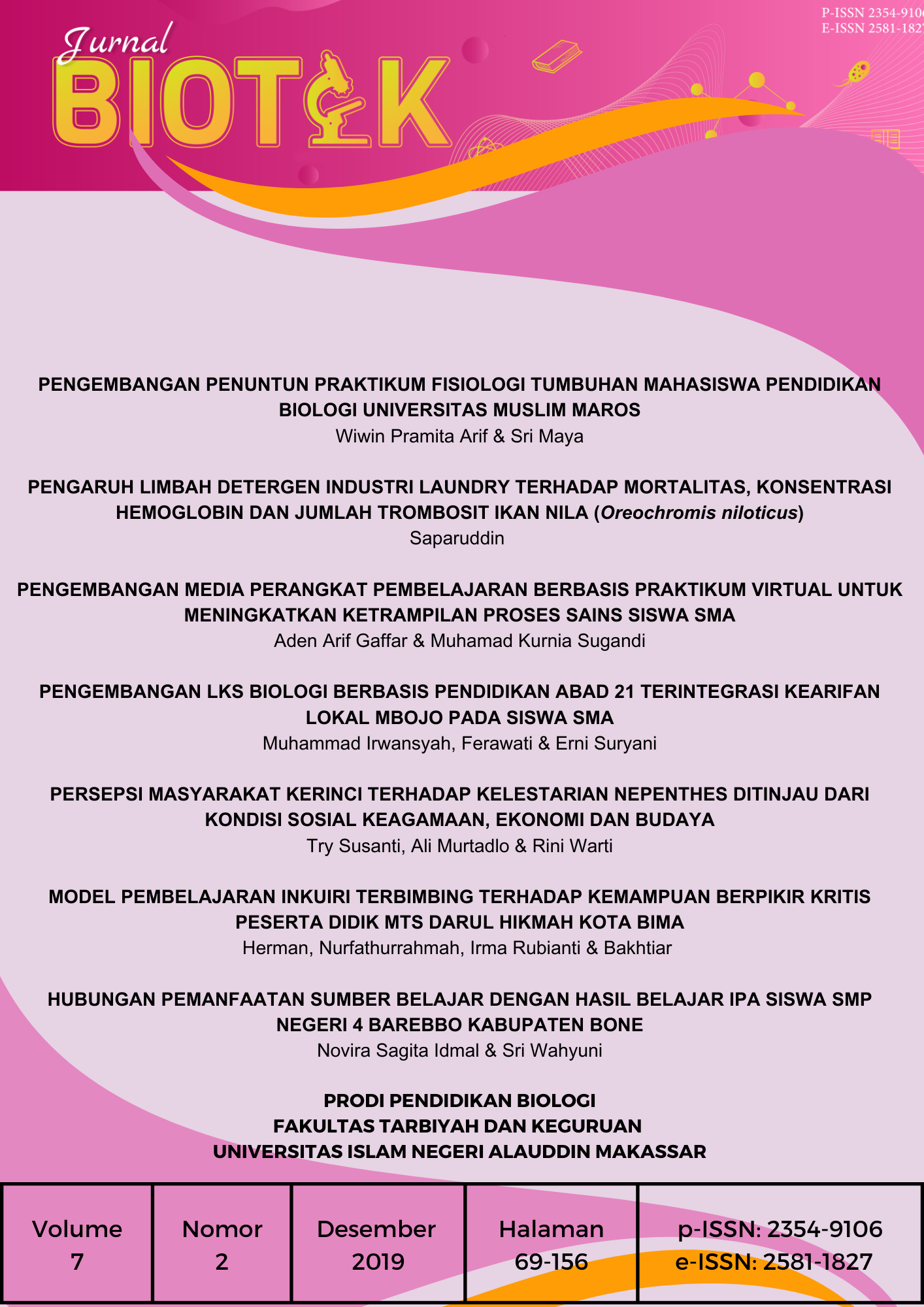PENGEMBANGAN MEDIA PERANGKAT PEMBELAJARAN BERBASIS PRAKTIKUM VIRTUAL UNTUK MENINGKATKAN KETRAMPILAN PROSES SAINS SISWA SMA
Abstrak
Students difficulties in understanding topics during learning process has an impact on student learning outcomes. The virtual practicum allows students to explore and visualize the concept of learning in more detail and clearly than just a theoretical explanation especially in biology topics. The aim of this research is to develop learning media based on virtual practicum, and improve students' science process skills. The research is a R&D (Research and Development) using nontest in the form of a valid questionnaire. The results of virtual practicum media feasibility were 79% with good criteria, 76% content with good criteria, 78% linguistic with good criteria, and 95% practicality with very good criteria. An advance trial of the media was carried out in the academic year 2019/2020 in class X Senior High School 1 Sindangwangi, Majelengka districts. The results indicate that learning media tools based on virtual practicum has increase the science process skills of students. The pretest value is 9.1% and increase to 88% in posttest. The value of t count 12.89> t table 2.24. Based on the results of the study it can be concluded that the media of virtual practicum-based learning tools is feasible to use and can improve the ability of students' science processes in the concept of invertebrates.
##plugins.generic.usageStats.downloads##
Referensi
Adi, W. C., Suratno, S., & Iqbal, M. (2016). Pengembangan Virtual Laboratory Sistem Ekskresi dalam Meningkatkan Motivasi Belajar Siswa SMA. Jurnal Pendidikan Sains, 4(4), 130-136.
Ainin, M. (2013). Penelitian pengembangan dalam pembelajaran bahasa Arabi. OKARA: Jurnal Bahasa Dan Sastra, 7(2).
Ambarsari, W., Santosa, S., & Maridi, M. (2013). Penerapan pembelajaran inkuiri terbimbing terhadap keterampilan proses sains dasar pada pelajaran biologi siswa kelas VIII SMP Negeri 7 Surakarta. Jurnal Pendidikan Biologi, 5(1), 81-95.
Arikunto, S. (2006). Dasar-dasar Evaluasi Pembelajaran. Jakarta: Bumi Aksara.
Daryanto. (2008). Evaluasi Pendidikan. Jakarta: Rineka Cipta.
Dahar, R. W. (1989). Teori-teori Belajar. Jakarta. Erlangga
Diwakar, S., Achuthan, K., Nedungadi, P., & Nair, B. (2011). Enhanced facilitation of biotechnology education in developing nations via virtual labs: analysis, implementation and case-studies. International Journal of Computer Theory and Engineering, 3(1), 1.
Faour, M. A., & Ayoubi, Z. (2018). The effect of using virtual laboratory on grade 10 students’ conceptual understanding and their attitudes towards physics. JOURNAL OF EDUCATION IN SCIENCE ENVIRONMENT AND HEALTH, 4(1), 54-68.
Fraenkel, J. R. Dan Wallen, N.E. (2007). How to design an Evaluate Research in Education. New York: McGraw-Hill Companies.
Gall, M. D., Gall, J. P., & Borg, W. R. (2007). Educational research: An introduction. Boston: Pearson/Allyn & Bacon.
Imran. (2012). Ayo manfaatkan Laboratorium Virtual. [Online]. Tersedia: http://mazguru.wordpress.com/2012/04/19/ayo-manfaatkan-laboratorium-virtual. (19 Agustus 2019).
Jaya, H. (2012). Pengembangan laboratorium virtual untuk kegiatan paraktikum dan memfasilitasi pendidikan karakter di SMK. Jurnal Pendidikan Vokasi, 2(1).
Joyoatmojo, S. (2006). Belajar Mandiri: Bekal Untuk Menapak Jalan Menuju Belajar Sepanjang Hayat. Surakarta: UNS.Sds.
Litasari, K. N., Setiati, N., & Herlina, L. (2014). Profil Pembelajaran Biologi Berbasis Laboratorium dan Implikasinya Terhadap Hasil Belajar Siswa di SMA Negeri Se-Kabupaten Semarang. Journal of Biology Education, 3(2).
Morris, C., Andreetto, P., Banci, L., Bonvin, A. M., Chojnowski, G., del Cano, L., ... & Giachetti, A. (2019). West-Life: A Virtual Research Environment for structural biology. Journal of Structural Biology: X, 1, 100006.
Muhamad, M., Zaman, H. B., & Ahmad, A. (2010). Virtual laboratory for learning biology–a preliminary investigation. World Academy of Science, Engineering and Technology, 6(71), 775-778.
Rustaman, N.Y. Dirdjosoemarto, S,. Yudianto, S. A., Achmad, Y, (2003). Strategi Belajar Mengajar Biologi Common Text Book, Jurusan Pendidikan Biologi FPMIPA UPI.
Spernjak, A., & Sorgo, A. (2018). Differences in acquired knowledge and attitudes achieved with traditional, computer-supported and virtual laboratory biology laboratory exercises. Journal of Biological Education, 52(2), 206-220.
Sugiyono, J. (2008). Metode Penelitian Pendidikan Pendekatan Kuantitatif, Kualitatif, dan R & D. Bandung: Alfabeta.
Turner III, D. W. (2010). Qualitative interview design: A practical guide for novice investigators. The qualitative report, 15(3), 754-760.
Ulwan, M. N. (2015). Mendeteksi Autokorelasi dengan Run Test. Online), http://www. portalstatistik. com/2014/05/mendeteksi-autokorelasi-dengan-runtest. html, diakses, 25.
##submission.copyrightStatement##
##submission.license.cc.by-sa4.footer##Authors who publish with Jurnal Biotek agree to the following terms: Authors retain the copyright and grant Universitas Islam Negeri Alauddin Makassar right of first publication with the work simultaneously licensed under a Creative Commons Attribution License (CC BY-SA 4.0) that allows others to share (copy and redistribute the material in any medium or format) and adapt (remix, transform, and build upon the material) the work for any purpose, even commercially with an acknowledgement of the work's authorship and initial publication in Universitas Islam Negeri Alauddin Makassar. Authors are able to enter into separate, additional contractual arrangements for the non-exclusive distribution of the journal's published version of the work (e.g., post it to an institutional repository or publish it in a book), with an acknowledgement of its initial publication in Universitas Islam Negeri Alauddin Makassar. Authors are permitted and encouraged to post their work online (e.g., in institutional repositories or on their website) prior to and during the submission process, as it can lead to productive exchanges, as well as earlier and greater citation of published work (See The Effect of Open Access).

This work is licensed under a Creative Commons Attribution-ShareAlike 4.0 International License.



